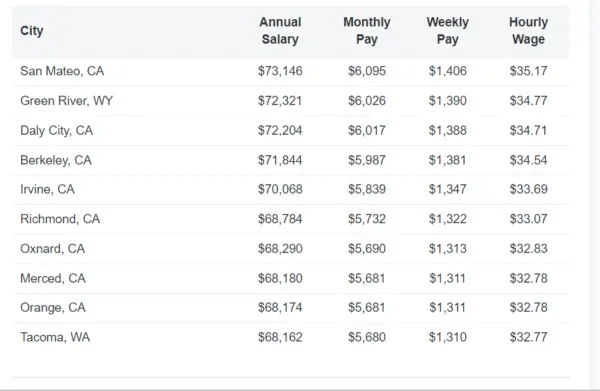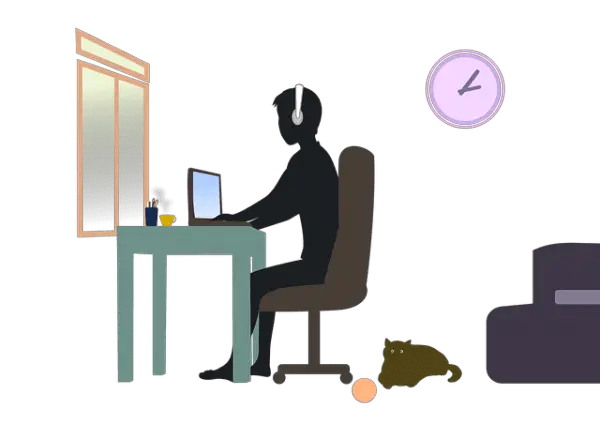Just like every other remote career path, becoming a remote case manager with no experience is not an impossible feat.
Remote case management can be an incredibly rewarding career path for those who are passionate about helping people, but it can be difficult to know where to start if you don’t have any prior experience in the field.
Fortunately, there are steps you can take to become a remote case manager even if you don’t have previous experience. In this blog post, we’ll explore the skills and qualifications that are necessary for remote case management, as well as the steps you can take to build your resume and increase your chances of landing a remote case management job. Whether you’re a recent graduate or considering a career change, this guide will provide you with a roadmap to becoming a successful remote case manager.
Who Is a Remote Case Manager?
A remote case manager is a professional who provides case management services to clients from a remote location, typically through phone, video conferencing, or other virtual means. Case management involves coordinating and monitoring the care of clients with complex health or social needs, such as those with chronic illnesses, disabilities, or mental health issues.
Remote case managers work closely with clients and their families to assess their needs, develop care plans, connect them with appropriate resources and services, monitor their progress, and provide ongoing support. They may also collaborate with healthcare providers, social service agencies, and other professionals to ensure that clients receive comprehensive care.
Remote case management has become increasingly common in recent years, as technology has made it easier for professionals to work from anywhere and connect with clients virtually. This approach to case management can be especially helpful for clients who live in rural or remote areas, have mobility limitations, or prefer to receive care from the comfort of their own homes.
Career Path for Product Manager: Everything You Need to Know to Get Started
What Is the Daily Routine of A Remote Case Manager?
Remote case managers have similar a range of responsibilities to that of an onsight one. Just like their onsight counterpart, the daily routine of a remote case manager may vary depending on their specific job duties and responsibilities, but here’s a general idea of what their typical day might look like:
- A remote case manager will typically start their day by reviewing the case files of their clients to ensure they have a good understanding of their client’s needs and progress.
- They also check their email inbox for any urgent messages from clients, colleagues, or supervisors. They will respond to any urgent messages and prioritize their tasks for the day accordingly.
- You might also spend time scheduling appointments with clients, making sure that they have the necessary information and resources to attend the appointments.
- Depending on your role, you may conduct client assessments to determine the level of care required and the appropriate services to be provided.
- Develop care plans: Based on the assessments, as a remote case manager, you will typically develop individualized care plans for each client, outlining the goals and objectives for their care.
- Communicate with clients: The remote case manager will typically spend time communicating with clients, providing them with updates on their care plans, answering questions, and addressing any concerns.
- Document progress: The remote case manager will document the progress of their clients, updating their case files regularly and making sure that all documentation is accurate and up-to-date.
- Attend meetings: The remote case manager may attend meetings with other healthcare professionals or service providers to discuss client care and coordinate services.
- Wrap up the day: The remote case manager will typically spend time wrapping up their day by reviewing their progress, updating their to-do lists, and preparing for the next day.
How To Become A Remote Case Manager With No Experience
Becoming a remote case manager without prior experience can be challenging, but it is possible with the right skills and approach. Here are some steps you can take to increase your chances of becoming a remote case manager with no experience:
1. Research the Field
Before pursuing a career in remote case management, it’s essential to understand what the job entails and what qualifications and skills employers are looking for. Remote case managers are responsible for coordinating care and services for patients or clients who are unable to manage their own care. This involves assessing patient needs, developing care plans, coordinating with healthcare providers, and monitoring patient progress. In addition to strong communication and problem-solving skills, remote case managers should have a good understanding of healthcare laws and regulations, medical terminology, and insurance billing procedures.
To research the field, you can start by looking for job postings for remote case managers and reading the job descriptions. This will give you an idea of the required skills, qualifications, and experience levels for the position. You can also check industry associations such as the Case Management Society of America (CMSA) and the National Association of Social Workers (NASW) to learn more about the field and connect with professionals.
How To Become A QA Tester With No Experience: Complete Guide
2. Get Certified
Many employers require remote case managers to have a certification in case management. Certification demonstrates that you have the knowledge and skills necessary to perform the job effectively. Two organizations that offer case management certifications are the Commission for Case Manager Certification (CCMC) and the American Nurses Credentialing Center (ANCC). The CCMC offers the Certified Case Manager (CCM) certification, while the ANCC offers the Nurse Case Manager (RN-BC) certification. Both certifications require passing an exam and meeting specific education and experience requirements.
To become certified, you will need to review the certification requirements, complete any necessary education or experience, and pass the certification exam. Some certifications may require continuing education to maintain certification status. Getting certified can help you stand out from other candidates and show employers that you are committed to the field of case management.
3. Build Your Skills
Remote case managers need to have a variety of skills to be successful in their job, including strong communication, problem-solving, and organizational skills. They also need to be able to work independently, manage their time effectively, and collaborate with healthcare providers, patients, and families. If you don’t have any prior experience in case management, you can build these skills by volunteering or taking on part-time work in healthcare or social services.
Volunteering at a local hospital or nursing home can give you hands-on experience working with patients and healthcare providers. This can help you develop your communication and problem-solving skills and gain a better understanding of healthcare laws and regulations. You can also consider taking online courses or attending workshops to learn more about case management and related skills such as medical terminology, insurance billing, and care coordination.
4. Network
Networking is an essential part of building a successful career in case management. By connecting with professionals in the field, you can learn about job opportunities, gain insights into the industry, and make valuable connections that can help you advance in your career. Here are some ways to network in the case management field:
- Join professional organizations: Joining a professional organization such as the Case Management Society of America (CMSA) or the National Association of Social Workers (NASW) can help you connect with other case managers and stay up-to-date on industry news and trends.
- Attend industry events: Attending industry conferences and events can give you the opportunity to network with other case managers and learn about new developments in the field.
- Connect online: Joining online communities and forums can help you connect with case managers from around the world and share ideas and resources. LinkedIn is also a great platform to connect with other professionals in the field.
5. Gain Practical Experience
While building your skills and networking are important, gaining practical experience is crucial to becoming a successful remote case manager. Practical experience can come from a variety of sources, including internships, volunteer work, or part-time jobs in healthcare or social services. Look for opportunities to work with patients or clients in a healthcare or social services setting, and focus on building your communication and problem-solving skills.
Another way to gain practical experience is to work as a care coordinator or patient advocate. These roles are similar to case management and can provide valuable experience in coordinating care, communicating with healthcare providers and patients, and managing patient needs.
6. Apply for Entry-Level Positions
Once you have built your skills, gained practical experience, and earned any necessary certifications, it’s time to start applying for entry-level remote case management positions. Entry-level positions may be listed as “case management assistant” or “care coordinator,” and may require less experience than full-time case management positions. However, these positions can provide valuable experience and allow you to build your skills in a remote setting.
When applying for entry-level positions, highlight any relevant experience you have gained through volunteering, internships, or part-time jobs. Emphasize your communication and problem-solving skills, your ability to work independently and manage your time effectively, and your commitment to the field of case management. Don’t be discouraged if you don’t land your dream job right away – keep building your skills and gaining practical experience, and keep applying for entry-level positions until you find the right fit.
Job Prospect of A Remote Case Manager

According to Glassdoor, the estimated total pay for a Remote Case Manager is $66,605 per year in the United States area, with an average salary of $61,745 per year. The estimated additional pay is $4,860 per year. Additional pay could include cash bonuses, commission, tips, and profit sharing.
ZipRecruiter also recorded the salary of a remote case manager to be $61,425 a year in the United States. That’s approximately $29.53 an hour. This is the equivalent of $1,181/week or $5,118/month. The above salary scale shows that the job prospects for remote case managers are growing. Plus remote case managers can work in a variety of fields, including healthcare, social work, insurance, and legal services. In healthcare, for example, remote case managers may work with patients to develop and implement care plans, coordinate services, and monitor progress.
How Can You Build Your Resume to Fit that Of a Remote Case Manager?
To build a resume that fits a remote case manager role, you should highlight your skills and experience in case management and your ability to work independently and remotely. Here are some tips to help you create a resume for a remote case manager position:
- Begin with a clear summary statement that highlights your experience as a case manager and your ability to work remotely. This should be a brief statement that captures the attention of the hiring manager.
- Include a section that outlines your relevant work experience. This should include the name of the company, your job title, and a description of your duties and responsibilities as a case manager. Be sure to emphasize any experience you have working remotely, as well as your ability to manage a caseload independently.
- Highlight your communication skills. Remote case managers need to be excellent communicators since they will often work with clients and colleagues over email, phone, or video conference. Be sure to mention any experience you have with these types of communication methods.
- Mention your ability to use technology. As a remote case manager, you will need to be comfortable with using technology to manage your caseload. This may include using case management software, video conferencing tools, or other online platforms. Highlight any relevant skills and experience you have with technology.
- Mention any relevant certifications or training you have completed. This could include training in case management, remote work, or related fields. Be sure to include any certifications or licenses you hold, such as a social work license or nursing certification.
- Emphasize your ability to work independently. As a remote case manager, you will need to be self-motivated and able to manage your workload independently. Mention any experience you have working in a remote or independent setting.
- Finally, make sure your resume is well-organized and easy to read. Use clear section headings and bullet points to make your information easy to digest. Be sure to proofread your resume carefully for spelling and grammar errors.
Conclusion
With the right mindset, skills, and training, anyone can transition into this rewarding and flexible career. It’s essential to start by gaining the necessary education and certification, as well as building a solid foundation of transferable skills such as communication, critical thinking, and problem-solving. Networking and gaining practical experience through internships or volunteer work can also help in securing remote case management positions. Remember, remote case management requires dedication, organization, and a willingness to adapt to new technologies and work environments. By following the tips and strategies outlined in this guide, you can embark on a fulfilling career as a remote case manager with no prior experience.






